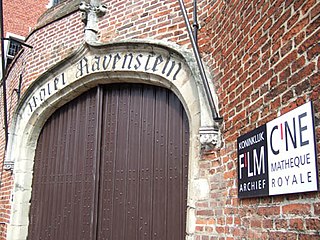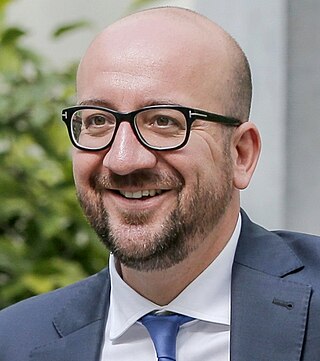Related Research Articles

The Flemish Region, usually simply referred to as Flanders, is one of the three regions of Belgium—alongside the Walloon Region and the Brussels-Capital Region. Covering the northern portion of the country, the Flemish Region is primarily Dutch-speaking. With an area of 13,626 km2 (5,261 sq mi), it accounts for only 45% of Belgium's territory, but 58% of its population. It is one of the most densely populated regions of Europe with around 500/km2 (1,300/sq mi).

Le Soir is a French-language Belgian daily newspaper. Founded in 1887 by Émile Rossel, it was intended as a politically independent source of news. Together with La Libre Belgique, it is one of the country's most popular Francophone newspapers in both Brussels and Wallonia, and since 2005 has been published in Berliner format. It is owned by Rossel & Cie, which also owns several Belgian news outlets, as well as the French paper La Voix du Nord.
Operation Vigilant Guardian was a Belgian army operation following the January 2015 Île-de-France attacks and the dismantling of a terrorist cell in Verviers having foiled attacks imminent, to deal with the terrorist threat and protect the "points" sensitive territory. The operation was put in place 16 January 2015 and ended on 1 April 2021.

The Belgian Resistance collectively refers to the resistance movements opposed to the German occupation of Belgium during World War II. Within Belgium, resistance was fragmented between many separate organizations, divided by region and political stances. The resistance included both men and women from both Walloon and Flemish parts of the country. Aside from sabotage of military infrastructure in the country and assassinations of collaborators, these groups also published large numbers of underground newspapers, gathered intelligence and maintained various escape networks that helped Allied airmen trapped behind enemy lines escape from German-occupied Europe.

Hans Van Themsche is a Belgian student who, on 11 May, 2006, shot three people, killing two and severely injuring another, before being shot by police and incapacitated. He was sentenced to life in prison in 2008.
The Belgian stay-behind network, colloquially called "Gladio", was a secret mixed civilian and military unit, trained to form a resistance movement in the event of a Soviet invasion and part of a network of similar organizations in North Atlantic Treaty Organization states. It functioned from at least 1951 until 1990, when the Belgian branch was promptly and officially dissolved after its existence became publicly known following revelations concerning the Italian branch of the stay-behind network.

Despite being neutral at the start of World War II, Belgium and its colonial possessions found themselves at war after the country was invaded by German forces on 10 May 1940. After 18 days of fighting in which Belgian forces were pushed back into a small pocket in the north-west of the country, the Belgian military surrendered to the Germans, beginning an occupation that would endure until 1944. The surrender of 28 May was ordered by King Leopold III without the consultation of his government and sparked a political crisis after the war. Despite the capitulation, many Belgians managed to escape to the United Kingdom where they formed a government and army-in-exile on the Allied side.
The André Cavens Award is an accolade presented annually by the Belgian Film Critics Association (UCC), an organization of film critics from publications based in Brussels. The André Cavens Award was introduced in 1976 by the organizing committee to honor cinematic achievement in Belgium. The name of the award comes from film director André Cavens.
The mass media in Belgium is characterized by its diversity due to the linguistic divide in the country.

The Battle of Timbuktu occurred in Timbuktu, Mali, in March 2013, between Islamist groups and Mali government forces supported by France.

The German occupation of Belgium during World War II began on 28 May 1940, when the Belgian army surrendered to German forces, and lasted until Belgium's liberation by the Western Allies between September 1944 and February 1945. It was the second time in less than thirty years that Germany had occupied Belgium.

The Royal Belgian Film Archive is a cinematheque located in the Centre for Fine Arts, in Brussels, Belgium. It is often referred to as CINEMATEK.

During World War II, Belgian prisoners of war were principally Belgian soldiers captured by the Germans during and shortly after the Battle of Belgium in May 1940.

The General Directorate for Territorial Surveillance, is the civilian domestic intelligence service of Morocco. It is tasked with the monitoring and anticipation of potentially subversive domestic activities.

The Michel I Government was the Federal Government of Belgium formed following the 2014 Belgian government formation and sworn in on 11 October 2014. The administration was a centre-right coalition of the New Flemish Alliance (N-VA), the Christian Democratic and Flemish (CD&V), the Open Flemish Liberals and Democrats and the Reformist Movement (MR). The prime minister was Charles Michel. The government had an agenda of socio-economic reforms, especially through austerity measures, with its priorities being improving Belgium's economic competitiveness and reducing unemployment. It fell in December 2018 over the Global Compact for Migration.

On 15 January 2015, Belgian police carried out a raid on premises in Verviers, Belgium. According to news sources, the raids were an anti-terrorist operation against Islamist radicals.
André Adam was a Belgian-French diplomat. His postings during his lengthy diplomatic career included Consul General of Belgium in Los Angeles (1982–1986), Ambassador to Algeria (1986–1990), Ambassador to Zaire (1990–1991), Ambassador to the United States (1994–1998), and Permanent Representative to the United Nations (1998–2001). He was killed in the double suicide bombing at Brussels Airport on 22 March 2016.
Farid Melouk is a French-Algerian former member of the Armed Islamic Group (GIA) and convicted terrorist, known for his central role in jihadist networks.
Angeline Flor Pua is a Belgian model and beauty pageant titleholder who was crowned Miss Belgium 2018. As Miss Belgium, she represented Belgium at Miss World 2018 and Miss Universe 2019.
Céline Van Ouytsel is a Belgian model and beauty pageant titleholder who was crowned Miss Belgium 2020. She was chosen to represent Belgium at Miss World 2022.
References
- ↑ "De nouvelles découvertes" (in French). La Libre Belgique. 2006-09-08.
- ↑ "Mandats d'arrêts confirmés pour les néo-nazis" (in French). Le Soir. 2006-09-13. Archived from the original on 2007-03-12.
- ↑ "Un 'terror game' avant les attentats" (in French). Le Soir. 2006-09-12. p. 6.
- ↑ "Un groupe terroriste néonazi démantelé" (in French). Le Nouvel Observateur. 2006-09-08.[ permanent dead link ]
- ↑ "La Belgique démantèle un groupe néonazi préparant des attentats" (in French). Le Monde. 2006-09-07. Archived from the original on 2012-06-04. Retrieved 2006-09-13.
- ↑ "Des militaires néonazis voulaient commettre des attentats" (in French). RTL Belgique. 2006-09-08.
- ↑ "Des militaires néonazis voulaient déstabiliser la Belgique par des attentats" (in French). AFP. 2006-09-08.[ permanent dead link ]
- ↑ "La Belgique découvre, stupéfaite, un complot néonazi au sein de son armée" (in French). AFP. 2006-09-08.[ permanent dead link ]
- ↑ "Un réseau terroriste de militaires néonazis démantelé en Belgique" (in French). Le Monde. 2006-09-08. Archived from the original on 2008-01-11. Retrieved 2006-09-13.
- ↑ "Belgium police hold 17 in 'plot'". BBC News . 2006-09-07.
- ↑ (in Dutch) Inlichtingendiensten staan op scherp door de dreiging van extreem rechts Archived 2012-04-02 at the Wayback Machine , De Telegraaf, 30 September 2006
- ↑ "La justice dément les propos de VTM" (in French). Le Soir. 2006-09-13.
- ↑ "Un arrière-goût d'années de plomb" (in French). La Libre Belgique. 2006-09-08.
- ↑ "Les néonazis voulaient déstabiliser le pays" (in French). Le Soir. 2006-09-07. Archived from the original on 2006-10-14.